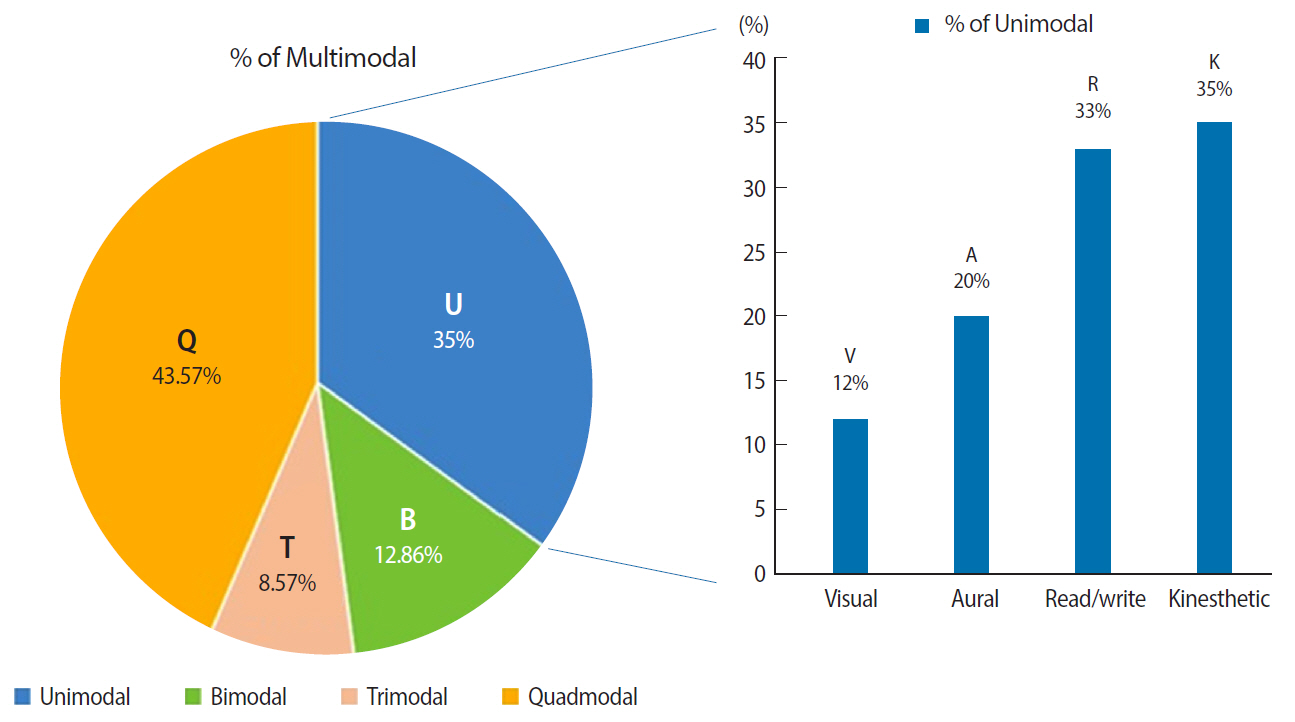J Educ Eval Health Prof.
2016;13:38. 10.3352/jeehp.2016.13.38.
Learning styles, academic achievement, and mental health problems among medical students in Thailand
- Affiliations
-
- 1Faculty of Medicine, Chiang Mai University, Chiang Mai, Thailand.
- 2Department of Psychiatry, Faculty of Medicine, Chiang Mai University, Chiang Mai, Thailand. nahathai.wongpakaran@cmu.ac.th
- KMID: 2413787
- DOI: http://doi.org/10.3352/jeehp.2016.13.38
Abstract
- PURPOSE
This study aimed to investigate the prevalence of various learning styles among medical students and their correlations with academic achievement and mental health problems in these students.
METHODS
This study was conducted among 140 first-year medical students of Chiang Mai University, Thailand in 2014. The participants completed the visual-aural-read/write-kinesthetic (VARK) questionnaire, the results of which can be categorized into 4 modes, corresponding to how many of the 4 types are preferred by a respondent. The 10-item Perceived Stress Scale (PSS-10) and the 21-item Outcome Inventory (OI-21) were also used. The participants' demographic data, grade point average (GPA), and scores of all measurements are presented using simple statistics. Correlation and regression analysis were employed to analyze differences in the scores and to determine the associations among them.
RESULTS
Sixty percent of the participants were female. The mean age was 18.86±0.74 years old. Quadmodal was found to be the most preferred VARK mode (43.6%). Unimodal, bimodal, and trimodal modes were preferred by 35%, 12.9%, and 18.6% of the participants, respectively. Among the strong unimodal learners, visual, aural, read/write, and kinesthetic preferences were reported by 4.3%, 7.1%, 11.4%, and 12.1% of participants, respectively. No difference was observed in the PSS-10, OI-anxiety, OI-depression, and OI-somatization scores according to the VARK modes, although a significant effect was found for OI-interpersonal (F=2.788, P=0.043). Moreover, neither VARK modes nor VARK types were correlated with GPA.
CONCLUSION
The most preferred VARK learning style among medical students was quadmodal. Learning styles were not associated with GPA or mental health problems, except for interpersonal problems.
MeSH Terms
Figure
Cited by 1 articles
-
Prevalence and associated factors of ADHD-like symptoms among pharmacy students at Prince of Songkla University, Thailand in 2024: a cross-sectional study
Krittiya Rakchat, Saranan Eadcharoen, Amarawan Pentrakan
Ewha Med J. 2024;47(4):e70. doi: 10.12771/emj.2024.e70.
Reference
-
References
1. James S, D’Amore A, Thomas T. Learning preferences of first year nursing and midwifery students: utilising VARK. Nurse Educ Today. 2011; 31:417–423. https://doi.org/10.1016/j.nedt.2010.08.008.
Article2. Fleming ND, Mills C. Not another inventory: rather a catalyst for reflection. In : Wulff DH, Nyquist JD, editors. To improve the academy: resources for faculty, instructional and organizational development. Stillwater (OK): New Forums Press;1992. p. 137–155.3. Peyman H, Sadeghifar J, Khajavikhan J, Yasemi M, Rasool M, Yaghoubi YM, Nahal MM, Karim H. Using VARK approach for assessing preferred learning styles of first year medical sciences students: a survey from Iran. J Clin Diagn Res. 2014; 8:GC01–GC04. https://doi.org/10.7860/JCDR/2014/8089.4667.
Article4. Panambur S, Nambiar V, Heming T. Learning style preferences of preclinical medical students in Oman. Oman Med J. 2014; 29:461–463. https://doi.org/10.5001/omj.2014.120.
Article5. Baykan Z, Nacar M. Learning styles of first-year medical students attending Erciyes University in Kayseri, Turkey. Adv Physiol Educ. 2007; 31:158–160. https://doi.org/10.1152/advan.00043.2006.
Article6. Prithishkumar IJ, Michael SA. Understanding your student: using the VARK model. J Postgrad Med. 2014; 60:183–186. https://doi.org/10.4103/0022-3859.132337.
Article7. Almigbal TH. Relationship between the learning style preferences of medical students and academic achievement. Saudi Med J. 2015; 36:349–355. https://doi.org/10.15537/smj.2015.3.10320.
Article8. Liew SC, Sidhu J, Barua A. The relationship between learning preferences (styles and approaches) and learning outcomes among pre-clinical undergraduate medical students. BMC Med Educ. 2015; 15:44. https://doi.org/10.1186/s12909-015-0327-0.
Article9. Slater JA, Lujan HL, DiCarlo SE. Does gender influence learning style preferences of first-year medical students? Adv Physiol Educ. 2007; 31:336–342. https://doi.org/10.1152/advan.00010.2007.
Article10. Sarabi-Asiabar A, Jafari M, Sadeghifar J, Tofighi S, Zaboli R, Peyman H, Salimi M, Shams L. The relationship between learning style preferences and gender, educational major and status in first year medical students: a survey study from iran. Iran Red Crescent Med J. 2014; 17:e18250. https://doi.org/10.5812/ircmj.18250.
Article11. Jiraporncharoen W, Angkurawaranon C, Chockjamsai M, Deesomchok A, Euathrongchit J. Learning styles and academic achievement among undergraduate medical students in Thailand. J Educ Eval Health Prof. 2015; 12:38. https://doi.org/10.3352/jeehp.2015.12.38.
Article12. Pawuttipatthrapong S. VARK (Thai version) [Internet]. Chon Buri (Thailand): Burapha University;2014. [cited 2016 Jul 24]. Available from: http://vark-learn.com/wp-content/uploads/2014/08/The-VARK-Questionnaire-Thai.pdf.13. Leite WL, Svinicki M, Shi Y. Attempted validation of the scores of the VARK: learning styles inventory with multitrait–multimethod confirmatory factor analysis models. Educ Psychol Meas. 2010; 70:323–339. https://doi.org/10.1177/0013164409344507.
Article14. Wongpakaran T, Wongpakaran N. How the interpersonal and attachment styles of therapists impact upon the therapeutic alliance and therapeutic outcomes. J Med Assoc Thai. 2012; 95:1583–1592.15. Wongpakaran N, Wongpakaran T. The Thai version of the PSS-10: an investigation of its psychometric properties. Biopsychosoc Med. 2010; 4:6. https://doi.org/10.1186/1751-0759-4-6.
Article
- Full Text Links
- Actions
-
Cited
- CITED
-
- Close
- Share
- Similar articles
-
- Learning styles and academic achievement among undergraduate medical students in Thailand
- Participation and Academic Achievement by Learning Styles in Problem Based Learning
- Academic Achievement, Self-directed Learning, and Critical Thinking Disposition According to Learning Styles of Nursing Students
- Influence of Learning Presence of Non-Face-to-Face Class Experience in Nursing Students on Academic Achievement: Mediating Effect of Learning Flow and Moderated Mediation of Digital Literacy
- The Effects of Achievement Goal Orientation and Self-efficacy on Course Interests and Academic Achievement in Medical Students


